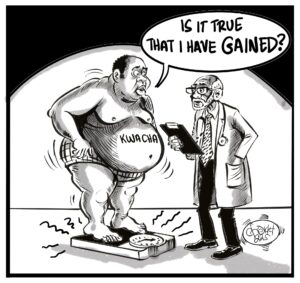Bank of Zambia (BoZ) governor Dr Denny Kalyalya has called on all stakeholders to treat the End Malaria Campaign by 2030 as an economic issue that needs concerted efforts from all stakeholders in order to reduce absenteeism and loss of productive hours by citizens.
And End Malaria Council (EMC) fundraising chairperson Peter Cottan says the campaign has a funding deficit of US $120 million.
Dr Kalyalya, who is also a member of the newly-appointed council, and representing Zambia’s financial sector, said the role of the financial industry was to help mobilize resources as stated by the fundraising committee, while providing support to the campaign through ventures that will attract funding.
“Everyone has a role to play in this End Malaria campaign starting from families, employees and individuals from all sectors of government and the business world, especially considering that prevention is better than cure, it is cheaper to prevent one from getting malaria than treating them,” observed Dr Kalyalya, a sentiment also shared by Health Minister Dr Chitalu Chilufya in his opening remarks at this month’s End Malaria Council meeting held at First Quantum Minerals Limited corporate offices in Lusaka, Thursday.
According to the health minister, malaria continued to be a public health concern in the country in which 13,700 confirmed cases were recorded from health centres on a daily basis, four deaths each day and a total of 1,200 deaths recorded 2018 alone.
“It is for this reason that the country’s efforts to reduce the malaria burden and address other health challenges are part of the broader agenda aimed at sustainable socio-economic development and structural transformation, which is guided by the Vision 2030 strategy,” said Dr Chilufya.
Representing First Quantum Minerals, health programmes and projects advisor Gertrude Musunka said the mine attached great importance to the fight against malaria and had gone flat out in its catchment areas through mass mobilization activities to educate its communities on how to prevent this disease.
She explained that from June, this year, FQM partnered with key stakeholders, such as the Ministry of Health, private entities and royal establishments in a robust campaign to end new infections of malaria cases through indoor residue spraying, sleeping under treated mosquito nets and ensuring that all those tested positive were treated on-site.
“In our efforts to contribute towards the elimination of malaria by 2030, we, as FQM, have so far trained 60 malaria agents across our catchment areas being the two subsidiaries – Kansanshi Mining Plc in Solwezi and Kalumbila Minerals Limited in Kalumbila District,” Musunka said.
She added that from June, this year, to-date, 40,000 people had been screened, and that from the same , 18,000 had been treated.
Musunka said FQM would like to expand its efforts through more campaign activities against malaria to other areas and not only focus on screening and testing, but also get involved in research that would indicate how they were working and assess if there was efficacy in the chemicals used in spraying.
“It takes the commitment of all community members to win the fight against malaria, which has continued claiming a lot of lives, especially among children and pregnant mothers in rural areas who cannot afford to sleep under a treated mosquito net and have their homes sprayed,” said Musunka.
And Cottan announced that the Ending Malaria campaign had a funding deficit of US $120 million, which was required to achieve the global results of ensuring that malaria was eliminated from the globe by the year 2030.



















